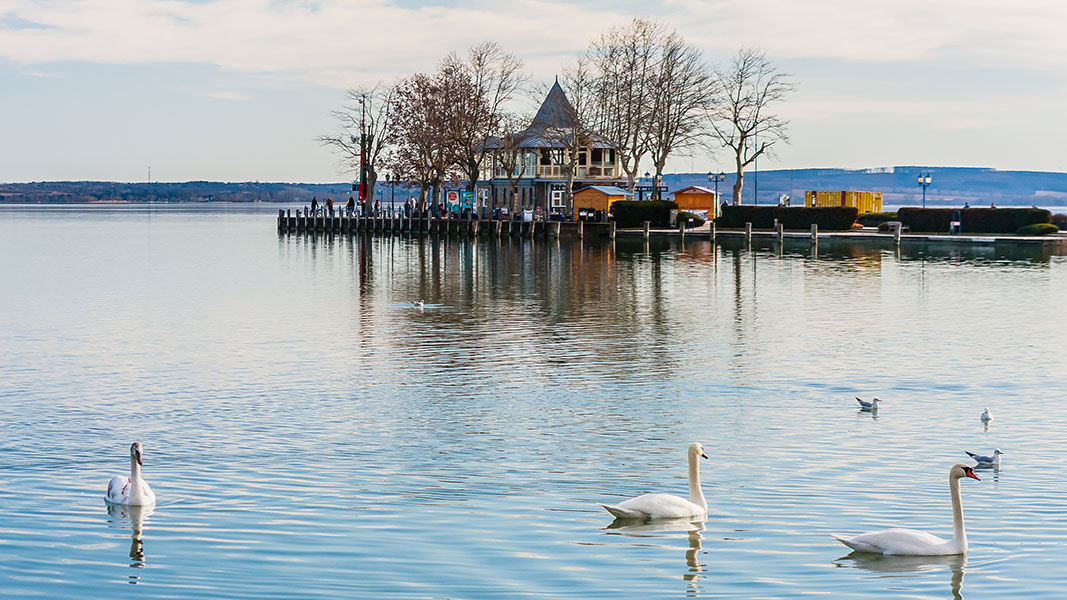The swan wakes at dawn and finds herself by the beach. There is a small wooden bridge that leads to a blue floating pontoon dock. Reed beds frame the beach and filter its water. Algae in the undercurrent colors the lake a green that looks turquoise from a distance. Insects and other birds hiding in the greenery call to the swan. There is trouble, they say, and we need your help. But she chooses to stay where she is.
An old couple are the first visitors to arrive. They place their towels on the blue floats furthest out into the lake and plan to defend this position for the rest of the day. There’s more space to stretch out their arms; it’s the best place to sunbathe.
A German man and his family come soon after. Underneath his jeans is a Speedo. He dons a swimming cap and goggles and is the first visitor to break the lake’s surface that day. He swims an elegant breaststroke. His Vietnamese wife sets up the picnic blanket on the grass, puts on her sunglasses, and closes her eyes. Their two-year-old son finds his clothes too hot and takes them all off. He heads to the nearby playground naked and alone.
The swan swims circles around the beach and watches more visitors arrive. She hums as she approaches a young French girl whose hair is ruffled like feathers and whose hands are outstretched. The mother shakes her head and pulls her daughter away.
An American woman dips her toes in the water—too cold. She lies on her back and tilts her head off one of the blue floats. The ends of her hair float on the lake. She sees the world upside-down: the cloudless sky is so close she could touch it. Hanging from a rippling ceiling, the mountains are stalactites that have smoothed out their jaggedness. The woman knows this is not real and the blood rush accumulated in her mind aches. She stands again. On her way back to her towel, she glimpses a water snake come to shore and swallow a fish.
The ladder descending into the water has steel handrails mysteriously charged with electricity. None of the shirtless schoolboys acknowledge how it shocks their hands when they brush it, how their hairs stick straight up. Instead, they play a roughhouse game of pushing each other off the dock. The boy with the lowest voice yells Mire vársz! and it sounds like a war cry. He tosses another boy over his shoulder into the lake, a thunderclap of flesh against water.
The overtone of violence does not scare the old couple. Rather, they feel preserving their precious spot was more than they bargained for; they leave quickly. They wave goodbye to the swan who ignores them. She reaches her beak into the water for a strand of seaweed.
The German man has been tired for a long time and refuses to stop swimming. The wife receives a phone call from her sister in Vietnam, who is grappling with ghosts. The wife does not know how to help. She has not clothed her son yet either. In the playground, he goes down the same small slide over and over again. At sunset, this family is the last to leave.
An egret flies across the sky in a perfectly straight line. Its tail and head could be confused with each other, like the egret is a different bird whose flight was recorded and is being played back in reverse, like there is no going forth without looking back.
The insects and other birds are still chirping, waiting for the swan to join them. You’re needed here, they say, not there. She looks for more seaweed, but the strands are all too short now and will not regrow anytime soon. There is no excuse to linger any longer. She ducks under the bridge and wades into the reed bed.
Nathan Xie is a writer from Connecticut and a recipient of One Story’s 2023 Adina Talve-Goodman fellowship and a Periplus Collective fellowship. His work can be found in SmokeLong Quarterly, Waxwing, Ghost Parachute, and more. His website is nathan-xie.com.

